人教版高中英语必修1短语、句型语法总复习
- 格式:doc
- 大小:120.50 KB
- 文档页数:17
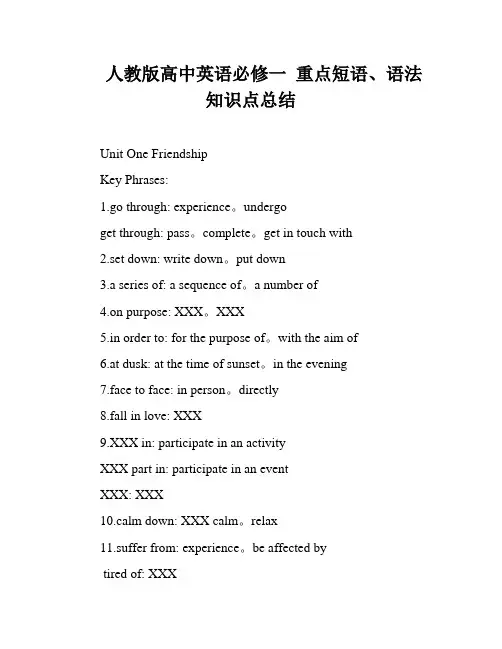
人教版高中英语必修一重点短语、语法知识点总结Unit One FriendshipKey Phrases:1.go through: experience。
undergoget through: pass。
complete。
get in touch with2.set down: write down。
put down3.a series of: a sequence of。
a number of4.on purpose: XXX。
XXX5.in order to: for the purpose of。
with the aim of6.at dusk: at the time of sunset。
in the evening7.face to face: in person。
directly8.fall in love: XXX9.XXX in: participate in an activityXXX part in: participate in an eventXXX: XXX10.calm down: XXX calm。
relax11.suffer from: experience。
be affected bytired of: XXX13.be concerned about: care about。
worry about14.get on/along well with: have a good nship with15.be good at/do well in: be skilled at。
excel in16.find it + adj。
to do sth.: consider doing something to be。
17.XXX: not anymore18.too much: an excessive amount (used with uncountable nouns)much too: excessively (used with adjectives)19.not…until: only after。
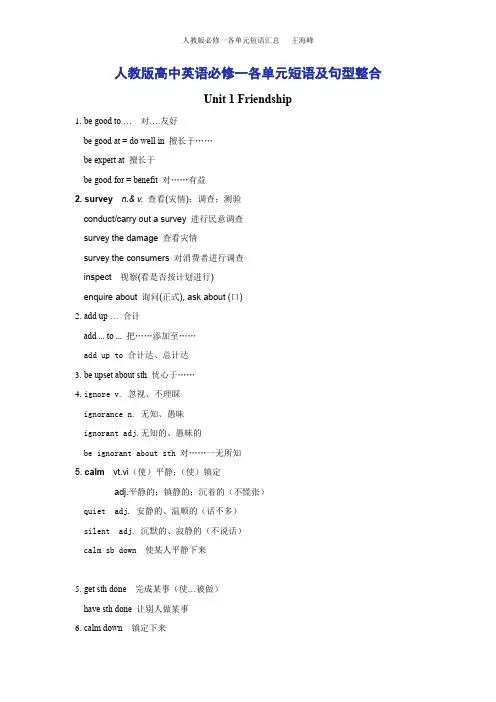
人教版高中英语必修一各单元短语及句型整合Unit 1 Friendship1.be good to … 对….友好be good at = do well in 擅长于……be expert at 擅长于be good for = benefit 对……有益2. survey n.& v.查看(灾情);调查;测验conduct/carry out a survey 进行民意调查survey the damage 查看灾情survey the consumers 对消费者进行调查inspect 视察(看是否按计划进行)enquire about 询问(正式), ask about (口)2.add up … 合计add … to …把……添加至……add up to 合计达、总计达3.be upset about sth 忧心于……4.ignore v. 忽视、不理睬ignorance n. 无知、愚昧ignorant adj.无知的、愚昧的be ignorant about sth 对……一无所知5. calm vt.vi(使)平静;(使)镇定adj.平静的;镇静的;沉着的(不慌张)quiet adj. 安静的、温顺的(话不多)silent adj. 沉默的、寂静的(不说话)calm sb down 使某人平静下来5.get sth done 完成某事(使…被做)have sth done 让别人做某事6.calm down 镇定下来calm adj. 平静的(无浪)镇静的、沉着的(不慌张)quiet adj. 安静的、温顺的(不吵闹)silent adj. 沉默的、寂静的(不说话)7.have got to do … 不得不8.be concerned about 关心、挂念be worried about 担心、忧虑be concerned for one’s safety 担心谁的安全be concerned with 相干、涉及、关心be involved in 被卷入、牵扯到9.walk the dog 遛狗10.make a list of … 列出11.share sth with sb 和某人分享某物12.go through … 经历;仔细检查get through 通过(考试)、做完(任务)、接通电话、熬过(困难时期)13.hide away… 躲藏;隐藏14.set down… 记下、放下、登记write down 记下take down 记下、拿下note down 记下、记录15.a series of …一系列;一套16.outdoors adv. 在户外、在野外outdoor adj. 户外的indoor adj. 室内的17.be crazy about … 对…着迷18.spellbound adj. 被迷住的19.on purpose 故意by design 故意地deliberately 故意地20. in order to/ so as to… 为了21. at dusk 在黄昏时刻at dawn 在黎明时刻at night 在夜里at noon 在中午22. thunder n. 雷、雷声v. 打雷23. entire adj. = whole 整个的、全部的whole/entire village/class/school全村/班/校entire/whole day/week/month/year 整天/周/月/年total adj. 总(计)的,total number/profit/area 总数/利润/面积complete adj. (用以强调)完全的,彻底的in complete agreement 完全一致in complete silence 万籁俱静a complete stranger 素不相识之人a complete set 整套21.power n. 能力、电力、政权、势力force n. 武力、暴力、力气=strengthenergy n. 能量、精力strength n. 力气20. face to face 面对面地back to back 背靠背shoulder to shoulder 并肩neck by neck 齐头并进side by side 肩并肩、并排22.according to … 按照;根据…所说23.get along with… 与…相处24.curtain n. 窗帘、幕draw/pull/close the curtain 把窗帘拉上draw back/pull back the curtain 把窗帘拉开词形易混:certain adj. 必然的、有把握的25.dusty adj. 积满灰尘的26.no longer / not any longer27.partner 伙伴、合作者、合伙人companion 伙伴cooperator 合作者28.settle vi. 安家、定居vt. 使定居、安排、解决settlement n. 解决、(会计)结算、定居点29.pack up… 收拾,打理行装30.suffer vt. & vi. 遭受、忍受suffer heavy losses 损失惨重suffer from 遭受、患suffer from cancer 患癌症31.loneliness n. 孤独、寂寞lonely adj. 孤独的、偏僻的alone adv. & adj. 独自地(的)32.highway n. 公路freeway / motorway n. 高速公路expressway n. 高速公路(美)33.recover v. 痊愈、恢复cover v.34.have trouble with sb/sth做…有困难35.fall in love with … 相爱36.throw away the friendship 放弃/终止友谊37.try out… 试验;试用38.join in 参加(活动)municate with sb 和…交际40.far and wide 到处41.look to sth 注意,留心某事42.cheat sb (out) of sth 骗取某人某物43.have the/a habit of doing sth有做…的习惯be ignorant of … 无知的Unit 2 English around the worldUnit 3 Travel JournalUnit 4 EarthquakesUnit 5 Nelson Mandela----a modern hero。

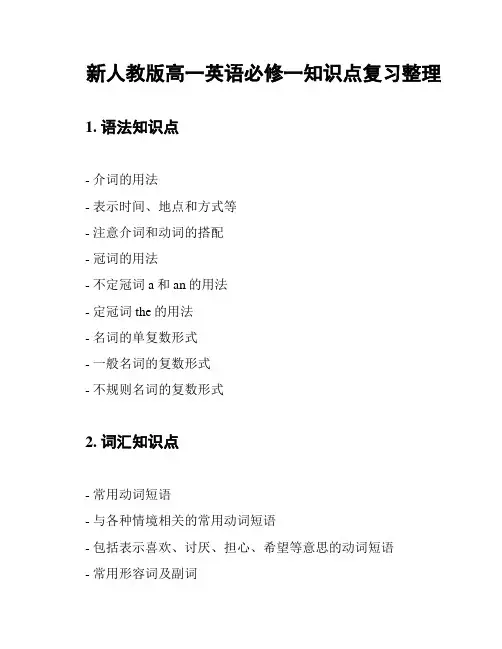
新人教版高一英语必修一知识点复习整理1. 语法知识点
- 介词的用法
- 表示时间、地点和方式等
- 注意介词和动词的搭配
- 冠词的用法
- 不定冠词a和an的用法
- 定冠词the的用法
- 名词的单复数形式
- 一般名词的复数形式
- 不规则名词的复数形式
2. 词汇知识点
- 常用动词短语
- 与各种情境相关的常用动词短语
- 包括表示喜欢、讨厌、担心、希望等意思的动词短语
- 常用形容词及副词
- 描述人、事物特征的常用形容词
- 表示时间、程度、方式等的常用副词- 高频词汇
- 重点掌握高频出现的单词和常用短语3. 阅读技巧
- 预测文意
- 根据上下文预测单词或句子的意思
- 联系上下文理解文章
- 通过上下文的线索来理解全文意思
- 抓住文中关键信息
- 注意文章中的重点句子,理解文章主旨4. 写作技巧
- 语法正确性
- 注意动词时态和主谓一致
- 尽量避免语法错误
- 结构完整性
- 确保文章有开头、主体和结尾
- 逻辑连贯性
- 使用适当的连接词
- 使用连接词使句子和句子之间衔接紧密
以上是《新人教版高一英语必修一》的知识点复习整理,希望对你的学习有所帮助。
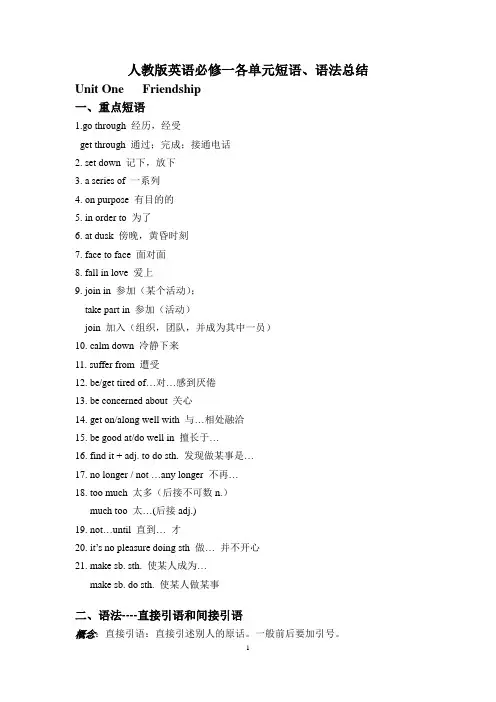
人教版英语必修一各单元短语、语法总结Unit One Friendship一、重点短语1.go through 经历,经受get through 通过;完成;接通电话2. set down 记下,放下3. a series of 一系列4. on purpose 有目的的5. in order to 为了6. at dusk 傍晚,黄昏时刻7. face to face 面对面8. fall in love 爱上9. join in 参加(某个活动);take part in 参加(活动)join 加入(组织,团队,并成为其中一员)10. calm down 冷静下来11. suffer from 遭受12. be/get tired of…对…感到厌倦13. be concerned about 关心14. get on/along well with 与…相处融洽15. be good at/do well in 擅长于…16. find it + adj. to do sth. 发现做某事是…17. no longer / not …any longer 不再…18. too much 太多(后接不可数n.)much too 太…(后接adj.)19. not…until 直到…才20. it’s no pleasure doing sth 做…并不开心21. make sb. sth. 使某人成为…make sb. do sth. 使某人做某事二、语法----直接引语和间接引语概念:直接引语:直接引述别人的原话。
一般前后要加引号。
间接引语:用自己的话转述别人的话。
间接引语在多数情况下可构成宾语从句且不要加引号。
例:Mr. Black said, “ I’m busy.”Mr. Black said that he was busy.变化规则(一)陈述句的变化规则直接引语如果是陈述句,变为间接引语时,用连词that(可省略)引导,从句中的人称、时态、指示代词、时间状语、地点状语都要发生相应的变化。
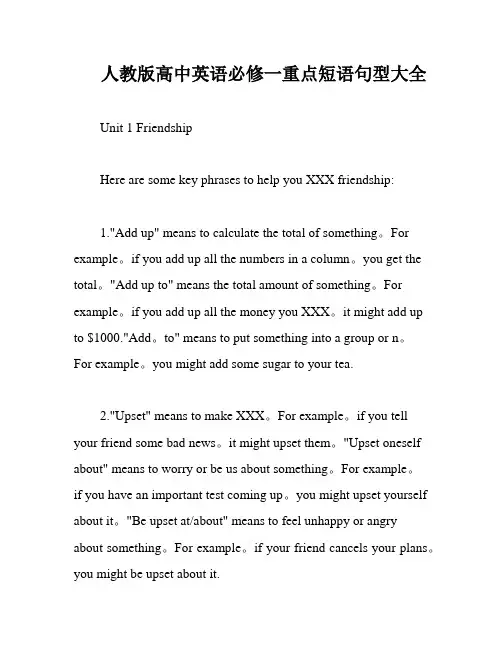
人教版高中英语必修一重点短语句型大全Unit 1 FriendshipHere are some key phrases to help you XXX friendship:1."Add up" means to calculate the total of something。
For example。
if you add up all the numbers in a column。
you get the total。
"Add up to" means the total amount of something。
For example。
if you add up all the money you XXX。
it might add up to $1000."Add。
to" means to put something into a group or n。
For example。
you might add some sugar to your tea.2."Upset" means to make XXX。
For example。
if you tell your friend some bad news。
it might upset them。
"Upset oneself about" means to worry or be us about something。
For example。
if you have an important test coming up。
you might upset yourself about it。
"Be upset at/about" means to feel unhappy or angryabout something。
For example。
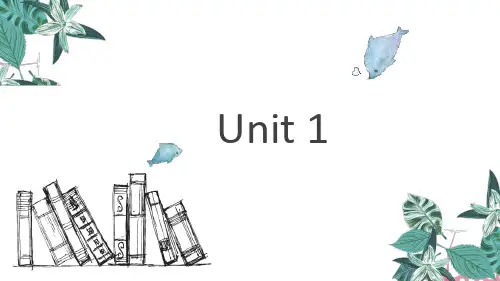
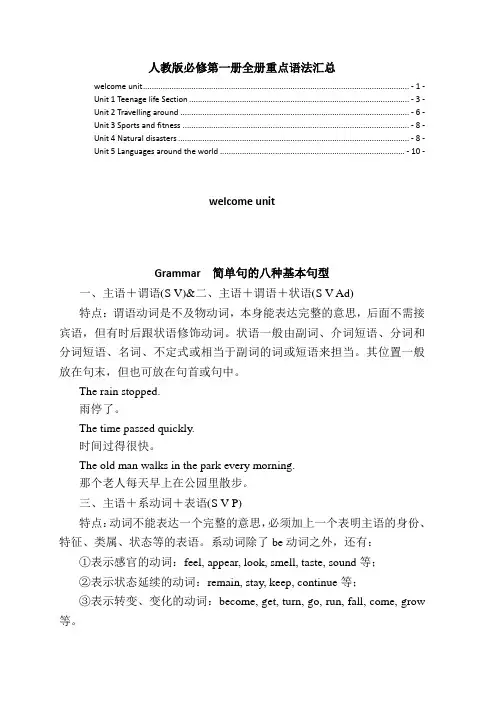
人教版必修第一册全册重点语法汇总welcome unit ......................................................................................................................... - 1 -Unit 1 Teenage life Section .................................................................................................... - 3 -Unit 2 Travelling around ........................................................................................................ - 6 -Unit 3 Sports and fitness ....................................................................................................... - 8 -Unit 4 Natural disasters ......................................................................................................... - 8 -Unit 5 Languages around the world .................................................................................... - 10 -welcome unitGrammar简单句的八种基本句型一、主语+谓语(S V)&二、主语+谓语+状语(S V Ad)特点:谓语动词是不及物动词,本身能表达完整的意思,后面不需接宾语,但有时后跟状语修饰动词。
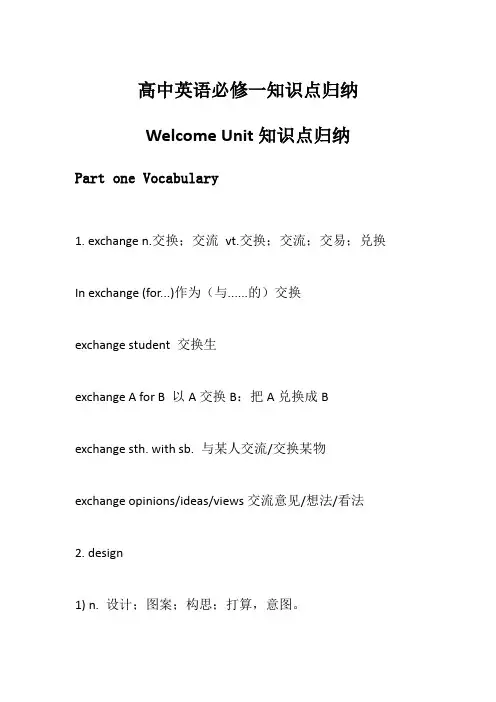
高中英语必修一知识点归纳Welcome Unit知识点归纳Part one Vocabulary1. exchange n.交换;交流vt.交换;交流;交易;兑换In exchange (for...)作为(与......的)交换exchange student 交换生exchange A for B 以A交换B:把A兑换成B exchange sth. with sb. 与某人交流/交换某物exchange opinions/ideas/views交流意见/想法/看法2. design1) n. 设计;图案;构思;打算,意图。
make designs for 为......做设计by design(=on purpose)故意地2) vt.设计,构思;计划;意欲。
design sth. for... 为...设计某物be designed to do... 旨在做...,用于做...3. anxious adj. 焦虑的;不安的be anxious for sb./ about sth. 为某人/某事担心be anxious for...渴望...be anxious (for sb.) to do sth. 渴望(某人)做某事be anxious that... 渴望...4. annoyed adj. 恼怒的;生气的be annoyed with sb.生某人的气be annoyed at/about sth.因某事生气be annoyed to do做...感到生气5. senior adj. 级别(或地位)高的n. 较年长的人senior high (school)高中be senior to sb. 比某人的地位/职位高6. impress vt. 使钦佩;给……留下深刻的好印象vi. 留下印象;引人注目have a(n) ...impression of... 对······有······印象leave/make a(n) ...impression on sb. 给某人留下······印象(be) under the impression that... 以为······,(通常指)误认为······7. concentrate on 集中精力于8. leave...alone 不打扰,不惊动9. explore vt.& vi. 探索;勘探exploration n. 探索,探测explorer n. 探险者;勘探者;考察者10. confident adj. 自信的;有把握的be confident about 对......有信心be confident of (doing) sth.对(做)······有把握be confident that... 确信······11. look forward to 盼望;期待12. organise vt. 组织;筹备;安排;组建vi. 组建;成立organisation n. 组织;团体;机构Part two Grammar句子成分和基本句型一、句子成分构成句子的各个部分叫作句子成分。
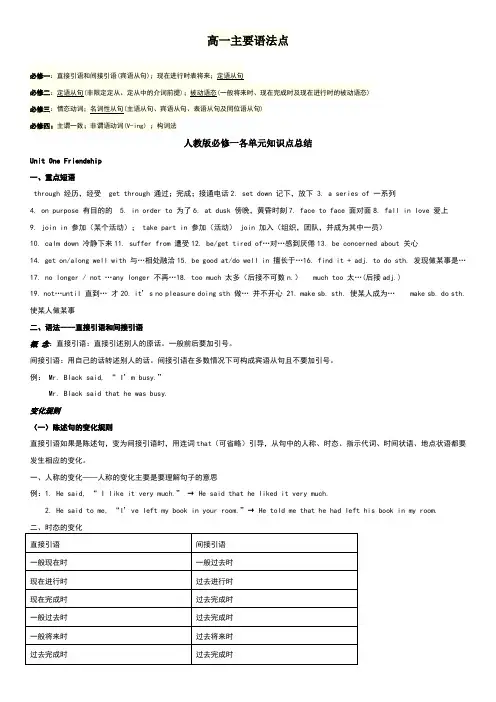
高一主要语法点人教版必修一各单元知识点总结Unit One Friendship一、重点短语through 经历,经受 get through 通过;完成;接通电话2. set down 记下,放下 3. a series of 一系列4. on purpose 有目的的5. in order to 为了6. at dusk 傍晚,黄昏时刻7. face to face 面对面8. fall in love 爱上9. join in 参加(某个活动); take part in 参加(活动) join 加入(组织,团队,并成为其中一员)10. calm down 冷静下来11. suffer from 遭受12. be/get tired of…对…感到厌倦13. be concerned about 关心14. get on/along well with 与…相处融洽15. be good at/do well in 擅长于…16. find it + adj. to do sth. 发现做某事是…17. no longer / not …any longer 不再…18. too much 太多(后接不可数n.) much too 太…(后接adj.)19. not…until 直到… 才20. it’s no pleasure doing sth 做… 并不开心 21. make sb. sth. 使某人成为… make sb. do sth. 使某人做某事二、语法----直接引语和间接引语概念:直接引语:直接引述别人的原话。
一般前后要加引号。
间接引语:用自己的话转述别人的话。
间接引语在多数情况下可构成宾语从句且不要加引号。
例:Mr. Black said, “ I’m busy.”Mr. Black said that he was busy.变化规则(一)陈述句的变化规则直接引语如果是陈述句,变为间接引语时,用连词that(可省略)引导,从句中的人称、时态、指示代词、时间状语、地点状语都要发生相应的变化。
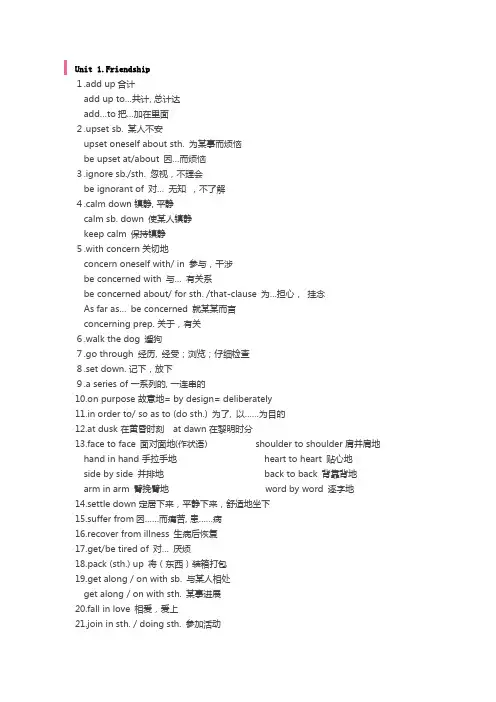
Unit 1.Friendship1.add up合计add up to…共计, 总计达add…to把…加在里面2.upset sb. 某人不安upset oneself about sth. 为某事而烦恼be upset at/about 因…而烦恼3.ignore sb./sth. 忽视,不理会be ignorant of 对…无知,不了解4.calm down 镇静, 平静calm sb. down 使某人镇静keep calm 保持镇静5.with concern 关切地concern oneself with/ in 参与,干涉be concerned with 与…有关系be concerned about/ for sth. /that-clause 为…担心,挂念As far as…be concerned 就某某而言concerning prep. 关于,有关6.walk the dog 遛狗7.go through 经历, 经受;浏览;仔细检查8.set down. 记下,放下9.a series of 一系列的, 一连串的10.on purpose 故意地= by design= deliberately11.in order to/ so as to (do sth.) 为了, 以……为目的12.at dusk 在黄昏时刻at dawn 在黎明时分13.face to face 面对面地(作状语) shoulder to shoulder 肩并肩地hand in hand 手拉手地heart to heart 贴心地side by side 并排地back to back 背靠背地arm in arm 臂挽臂地word by word 逐字地14.settle down 定居下来,平静下来,舒适地坐下15.suffer from因……而痛苦, 患……病16.recover from illness 生病后恢复17.get/be tired of 对…厌烦18.pack (sth.) up 将(东西)装箱打包19.get along / on with sb. 与某人相处get along / on with sth. 某事进展20.fall in love 相爱,爱上21.join in sth. / doing sth. 参加活动22.have trouble / difficulty / problem with sb. / sth. 和某人相处/ 做某事有困难have trouble / difficulty / problem (in) doing sth. 做某事有困难重点句子1.Your friend comes to school very upset.2.While walking the dog, you were careless and it got loose and was hit by a car.3.she and her family hid away for nearly twenty-five months before they were discovered.4.I wonder if it's because I haven't been able to be outdoors for so long that I've grown so crazyabout everything to do with nature.5.I can well remember that there was a time when a deep blue sky, the songs of the birds,moonlight and flowers could never have kept me spellbound.6.It was the first time in a year and a half that I'd seen the night face to face…7.It’s no pleasure looking through these any longer because nature is one thing that really mustbe experienced8.There is nothing wrong with you and this boy being friends and studying together.9.I still find it hard to make good friends with themunit 2.English around the world1.because of 因为(后接名词.代词.名词性从句)e up: 走上前来;被提出;(太阳.月亮)升起;发生3.base sth. on sth. 使……以……为依据/基础be based on sth. 以……为依据/基础4. present sth. to sb./present sb. with sth. 向某人赠送/颁发/授予/介绍某物5.make use of 利用;使用make full use of 充分利用make good use of 好好利用make little use of 不充分利用make the best (use) of 更好地利用;往好里做make the most of 更好地利用6.such as: 用于列举,往往不能把事物全部列出7. command sb. to do sth. 命令某人做某事command (that) sb. (should) do sth. 从句中用虚拟语气under the command of sb.=under sb’s command 在……的指挥下have a good command of English. 精通/熟练掌握英语8.request sth. from sb. 向某人索要某物request that sb. (should) do sth.It’s requested that 从句据要求make a request for sth. 要求/需要某物by request 应邀at sb’s request/at the request of sb.根据…的请求9.play a part in 在……中担任角色/起作用play an important/vital part/role in (doing) sth. 在……中起重要/至关重要的作用play the leading role/part 起主要作用,起带头作用,演主角10.make sense 有道理;有意义;讲得通11.hold on 别挂(电话);坚持12.ask directions 问路give directions 指路;给予指示in the direction of 朝……方向in all directions = in every direction 向四面八方13.put sth. down 写下;记下;镇压14.have fun with sth. 以……为乐重点句子11.Your friend comes to school very upset.12.While walking the dog, you were careless and it got loose and was hit by a car.13.she and her family hid away for nearly twenty-five months before they were discovered.14.I wonder if it's because I haven't been able to be outdoors for so long that I've grown so crazyabout everything to do with nature.15.I can well remember that there was a time when a deep blue sky, the songs of the birds,moonlight and flowers could never have kept me spellbound.16.It was the first time in a year and a half that I'd seen the night face to face…17.It’s no pleasure looking through these any longer because nature is one thing that really mustbe experienced18.There is nothing wrong with you and this boy being friends and studying together.19.I still find it hard to make good friends with themUnit 3.Travel journal1. transport…(from…) to…把…从…运到…2.prefer doing to doing 更喜欢干……而不愿干……prefer to do rather than do 宁愿干……而不愿干……prefer that sb (should) do 更宁愿某人干…3.have a preference for…对……偏爱have no particular preference 没有特别的偏好3.ever since. 从那以后4. persuade sb. to do sth.=persuade sb. into doing sth. 说服某人做……persuade sb. not to do=persuade sb. out of doing 说服某人停止做……;劝阻某人做……persuade sb. of sth. 或persuade sb. + that 从句使某人相信5.graduate from…从……毕业graduate sb. 授予某人学位或毕业文凭6.ahead of schedule 较预定的时间提前on schedule 按照预定的时间,按时behind schedule 迟于预定的时间;拖后be scheduled to do sth. 预定做某事7.be fond of (doing) sth.be into /crazy about (doing) sth. 喜爱(做)某事;对做某事感兴趣be interested in (doing) sth.anize sb. to do sth. 组织某人干某事9.care about 关心;忧虑;惦念care for 喜欢;照顾10.determine to do 决定做某事determine sb. to do sth. 使某人决定做某事be determined that 从句be determined to do sth 决定干某事=make up one’s mind to dowith determination 坚决地11.go on/ make/ take a journey to sp. 去某地旅行12. at an altitude of =at a height of 在……高度at a price of 以……的价格at a speed/ rate of 以……速度at a length of 在……长度at a depth/ width of 在……深度,宽度at a distance of 在……远的距离at the cost of 以……为代价13. read one’s mind 看出某人心思keep one’s mind on 专心于speak one’s mind 直言不讳bear/ keep sth. in mind 记住某事14.give in (to sb./ sth.) (向……)屈服;让步;投降give off 发出(蒸汽.光.热等)give out 分发;筋疲力尽give way to 让位于;妥协15.at a good pace 相当快地keep pace with 跟……齐步前进16.take a friendly attitude to/ towards us. 对我们采取友善的态度hold a positive/ negative attitude 持积极/消极态度17.as usual: 照常18.at midnight 在午夜at noon 在正午19.flow through sp. 流经某地20.insist on (sb’s) doing sth. 坚决要求(某人)做21.go/ run like clockwork 按计划进行;进展顺利22.weather forecast 天气预报23.be/ go out of view 从视野消失come into view 进入视线admire the view 欣赏景色in my view = from my point of view 依我看来take the view that 从句,持有……观点view sb. as sth. 把……看作24.put up the tents. 搭起帐篷put up your hands 举手put up the post 张贴海报put up ten people for night 为十人提供食宿过夜25.give my love/ best wishes to sb. 请代我向……问好/候重点句子21.Your friend comes to school very upset.22.While walking the dog, you were careless and it got loose and was hit by a car.23.she and her family hid away for nearly twenty-five months before they were discovered.24.I wonder if it's because I haven't been able to be outdoors for so long that I've grown so crazyabout everything to do with nature.25.I can well remember that there was a time when a deep blue sky, the songs of the birds,moonlight and flowers could never have kept me spellbound.26.It was the first time in a year and a half that I'd seen the night face to face…27.It’s no pleasure looking through these any longer because nature is one thing that really mustbe experienced28.There is nothing wrong with you and this boy being friends and studying together.29.I still find it hard to make good friends with themUnit 4.Earthquakes1.right/ straight away = at once 立刻;马上2.burst into a place=break into a place 突然闯进burst in 突然插嘴;打断burst into tears/ laughters/ flames 突然大哭/大笑/起火burst out crying/ laughing/ singing 突然哭起来/笑起来/唱起来3.as if/ though 仿佛;好像4.at an end 结束;终结in the end 最后;终于at the end (of sth.) 在结尾处;在(……)结束的时候by the end of this month 在本月末5.be/ lie/ stand in ruins 成为一片废墟the ruins of Yuanmingyuan 圆明圆遗迹ruin one’s health 毁坏某人健康ruin one’s hope 使某人希望破灭7. keep track of 记录;掌握……的线索8. rescue sb. from…从危险中救出a rescue team 救援队come/ go to one’s rescue 营救某人10.trap sb. in the mud= get/ be trapped in the mud被困在泥巴里面trap sb./ sth. into (doing)…诱使人/物(做)……set a trap 设圈套11.dig out (dug dug) 掘出;发现12.bury one’s face/ head in sth. 把脸/头伸到……里去bury oneself in= be buried in 埋头于;专心于be buried in thought 陷入了沉思13.build shelters for survivors 给幸存者建避难所take shelter from the rain 躲雨shelter me from blame 保护我免受责难14.judge sth. from/ by sth. 由……来判断judging from/ by sth. 由……来看(作状语)judge sb. to be…认为某人……As far as I can judge 据我判断make a judgement on sth. 对……作出判断15.express oneself 表达自己express the letter 用快递方式寄出信件16.rise by 20% 增长了20% rise to 200 增长到200rise from the chair 从椅子上站起来ask for a rise 要求涨工资get a rise 升级;涨工资17.run out of 从……跑出来;用光(不用被动)18.think little/ nothing of 轻视;忽视;think much/ highly of 重视;看重;对……高度评价think of sb. as…把……看作19.reach an agreement 达成协议reach a conclusion 得出结论reach him by telephone 用电话与他取得联系reach out for sth 伸手去拿out of the reach of sb. 在某人伸手够不着的地方within the reach of sb. 在某人伸手够得着的地方above/ beyond the reach of sb. 超出某人的能力20.in the open air 在户外21.honor sb. for sth.=be honored for sth. 因某事而受到尊敬/表彰be/ feel honored to do sth. 做某事感到荣幸It’s a great honor for sb. to do sth. 做某事对某人来说很荣幸have the honor to do/ of doing sth. 有做某事的荣幸do sb. an/the honor of doing(sth.) 赏光in honor of sb.=in sb’s honor为向……表示敬意;为纪念……22.the disaster-hit/stricken areas 受灾地区重点句子31.Your friend comes to school very upset.32.While walking the dog, you were careless and it got loose and was hit by a car.33.she and her family hid away for nearly twenty-five months before they were discovered.34.I wonder if it's because I haven't been able to be outdoors for so long that I've grown so crazyabout everything to do with nature.35.I can well remember that there was a time when a deep blue sky, the songs of the birds,moonlight and flowers could never have kept me spellbound.36.It was the first time in a year and a half that I'd seen t he night face to face…37.It’s no pleasure looking through these any longer because nature is one thing that really mustbe experienced38.There is nothing wrong with you and this boy being friends and studying together.39.I still find it hard to make good friends with themUnit 5.Nelson mandela-a modern hero1.be of high good/ low/ poor quality 质量高/低2.be active in…在……方面很积极/活跃take an active part in…积极参与……lead/live an active life 过着积极的生活3.devote oneself to sth./ doing sth. 献身于……;专心做某事devote one’s life/ time/ money/ energy to sth./ doing sth. 把本人的一生/时间/金钱/精力奉献于……be devoted to…专心致志于;忠于;喜欢4.in principle. 原则上;大致上stick to one’s principles 恪守自己的原则on the principle of 根据……的原则against one’s principle 违背某人的原则5.guidance on sth. 对某事物的指导offer guidance to sb. 给某人提供指导under/ with the guidance of sb. =under/ with sb’s guidance 在某人的指导下6.out of work=out of a job 失业out of control 失去控制out of patience 失去耐心out of reach 够不着out of date 过时out of sight 看不见out of money 钱花光out of mind 心不在焉out of order 坏了;混乱7.vote on…就……投票vote for/ against 投票赞成/反对vote to do 投票表决帮某事;8.attack sb. from behind 背后攻击make an attack on/ against…攻击;袭击;抨击under attack 遭到袭击/抨击air attack 空袭 a heart attack 心脏病突发9.as a matter of fact 事实上=in (actual) fact = actually10.blow up; 使丧气;炸毁blow out 吹灭blow down 刮倒11.be equal to 与……相等;等于;能胜任equal sb in sth = be an equal to sb in sth.在某方面与某人匹敌/势力相当equally adv.12.be in trouble 在危险;受罚;痛苦;忧虑等的处境中ask for trouble 自寻烦恼get into trouble 遇到麻烦;出事have trouble (in) doing sth. 做某事有困难make trouble 制造麻烦take great trouble to do sth 不辞辛苦做某事13.turn to 求助于;致力于;转向;变成;转变到14.lose heart 丧失勇气或信心lose face 丢脸lose weight 减肥lose one’s heart to 爱上;喜欢上lose one’s way 迷路lose one’s temper 发怒lose oneself in 迷上lose one’s sight 失明15.escape from.. 从……逃跑/脱e to power 当权;上台17.beg sb. to do sth. 乞求(某人)做某事beg sb. for sth. 向某人要某东西Beg your pardon 请原谅;请再说一遍18.reward sb. with sth. 用……酬谢某人in reward 作为报酬reward sb. for (doing) sth. 因…而酬谢某人as a reward for…作为……的报酬(奖赏)19.set out to do sth. 开始干……;着手于…... set out/ off for sp. 动身去某地set off 引爆,使……爆炸,动身set about doing sth 开始干(做)某事20.be sentenced to 被判处……(徒刑)21.have a good/ bad/ high/ low opinion of sb./ sth. 对……评价好/不好/高/低in one’s opinion = in the opinion of sb. 以……看来22.fight a battle 打仗fight for freedom 为争取自由而斗争fight against ……为反对……而战fight with…同……斗争/同……并肩作战fight with sb. about……因……而和某人争吵23.be in prison 坐牢(强调状态)escape from prison 越狱put/ throw sb. into prison 把某人投进监狱24.be grateful to sb. for sth. 因某事而感激某人25.achieve nothing 一无所获achieve success/ victory 获得成功/胜利achieve one’s purpose/ goal 达到目的achieve one’s aim/dream 实现目标/梦想重点句子41.Your friend comes to school very upset.42.While walking the dog, you were careless and it got loose and was hit by a car.43.she and her family hid away for nearly twenty-five months before they were discovered.44.I wonder if it's because I haven't been able to be outdoors for so long that I've grown so crazyabout everything to do with nature.45.I can well remember that there was a time when a deep blue sky, the songs of the birds,moonlight and flowers could never have kept me spellbound.46.It was the first time in a year and a half that I'd seen the night face to face…47.It’s no pleasure looking through these any longer because nature is one thing that really mustbe experienced48.There is nothing wrong with you and this boy being friends and studying together.49.I still find it hard to make good friends with them50.I would be grateful if you could give me some advice。
人教新课标高中英语必修一重点词组句子归纳总结英语必修一重点词组句子归纳总结必修1 Unit1重点词组句子归纳总结重点词组:1. be good to对….友好2. calm down平静下来;镇定下来3. add up合计,加起来add…to 把…加到add to增加,增添add up to 总共,总计4. 使役动词用法:have/make sb. do sth.使…做…get sb to do sth. 使…做…have/make/get sth done使…被做5. have got to不得不6. walk the dog遛狗7. make a list of列出8. hide away躲藏;隐藏9. share sth with sb和某人分享某物10. on purpose故意地11. be concerned about关心;挂念;为…担心be concerned with 与…有关as/so far as …is concern ed 就……而言concerning prep.关于;有关12.go through经历;仔细检查get through 完成;接通电话look through 浏览;翻阅live through 经历过13.set down/write down/put down放下;记下set aside 留出;不理会set about 开始做set off 动身,燃放set out 出发;开始;阐述14. a series of一系列;一套;一连串15. be crazy about对…着迷16.on purpose故意地17. in order to/so as to为了18.face to face面对面地19. get along with与…相处;进展20.pack up收拾,打包21. according to按照;根据…所说22.have trouble with sb/sth. 做…有困难have trouble(in)doing sth. 做…有困难/doc/a28356348.html,municate with sb和…交际24. try out试验;试用25.join in参加(活动,会议)join参加(组织,团体)26.fall in love(with sb.)相爱27. at dusk 黄昏,傍晚28.cheat sb(out) of sth骗取某人某物29. by oneself 独自30.have/form/develop the/a habit of doing sth有做…的习惯31.put away 把…收起来;储蓄32. get/be tired of 对…厌烦33. advice un.意见,建议,忠告advise v.建议advise doing sth.建议做…… advise sb. to do sth.建议某人做……advise. that sb./sth. (should) do 建议例:They strongly advised that the government (should) take measures to improve the transport. 34. no longer 不再35 . far 用作副词,“过于,…得多”36. lonely 指人孤独(含感情色彩)alone 指环境孤独(不含感情色彩)例:She lives alone, but she doesn’t feel lonely.37.much too 及其,非常,其后加adj./adv. too much 过于,太多,其后加un.38.suffer from 经历,遭受39. outdoor adj. 户外outdoors adv.户外地40. dare的用法1). 用作情态动词意为“敢”,后接动词原形,通常只用于否定句或疑问句以及if 或whether 之后,一般不用于肯定句:例:Dare you tell her the truth? 你敢告诉她事实真相吗?I don’t know whether he dare try. 我不知他是否敢试一试。
必修IUnit 1要点和短1、 add up合add up to⋯共 ,达add⋯ to 把⋯加在里面2、 upset sb.某人不安be upset at/about因⋯而3、 ignore sb./sth. 忽,不理睬upset oneself about sth.某事而be ignorant of ⋯无知,不认识ignorant adj 无知的,愚笨的ignorance n 无知 .愚笨4、 calm vt.&vi.(使)沉静;(使)定calm down静,calm sb. down使某人静adj. 沉静的;定的keep calm保持静5、 concern vt. 使担;波及;关系到n. 担忧;关注with concern 关切地沉静show (no) concern for/about sb. 某人(不)关怀 ,concern oneself with/ in 参加,干预 be concerned with 与⋯相关系 beconcerned about/ for sth. /that-clause ⋯担忧,牵挂As far as⋯be concerned就某某而言concerning prep.对于,相关6、 walk the dog 遛狗7、 go through, 受go through a hard time 了一段困期go through the baggage行李go through the newspaper go through lots of money 花了好多8、 set down. 下,放下Set aside 留出,出(,金),把⋯放一Set off 出,身,惹起,使爆炸Set up 成立Set about doing 开始,着手Set out to do sth.set down the ideas on paper把想法写在上set me down at the bus-stop在站我下9、 a series of 一系列的 , 一串的a series of books a series of stamps一套票a series of pictures 画10、on purpose 成心地 = by design= deliberately by chance/accident= accidentallylie to sb. on purpose 成心向某人撒on purpose to do sth. 了⋯而专门go there on purpose to see sb特.意到那边去看某人for/with the purpose of 了⋯地目的11、in order to/ so as to (do sth.) 了 , 以⋯⋯目的so as to 了“”, 只好用在句中。
高中英语必修一语法汇总Unit 1 短语短语或词组是具有一定意义但不构成句子或从句的一组词。
一、名词短语(NP)名词短语是指以一个名词为中心构成的短语。
(1)These ideas may seem strange to you.作主语(2)Welove our great motherland very much.作宾语(3)Theman wearing a black coat is our teacher.作表语(4)Those beautiful flowers come from Yun’nan.作主语(5)Weelected him monitor of our class.作宾语补足语[归纳总结](1)名词短语在句中作名词用,一般用作主语、宾语、表语、宾语补足语等。
(2)名词短语由“(限定词)+(数词、形容词、形容词短语、描述性名词)+名词+(介词短语)”组成。
[名师提醒]限定词包括冠词(a,an,the)、指示代词(this,that,these,those等)、物主代词(my,your,his,her,our,their等)和不定代词(some,no,neither,both等)。
[巩固内化1]指出黑体部分所作的成分①He got threegold medals at the 23rd Olympic Games.作宾语②The tall building was built last year.作主语③This is avery interesting book.作表语④We made him capital of our team.作宾补二、形容词短语(AdjP)形容词短语是指以一个形容词为中心构成的短语,在句子中的功能相当于形容词。
(1)Theair today is nice and clean.作表语(2)Sheis a girl lively and lovely.作定语(3)Hefound the film very interesting.作宾语补足语[归纳总结](1)形容词短语在句中作形容词用,可以修饰名词或代词,作定语,还可用作表语或者宾语补足语等。
人教版高中英语必修一重点短语、语法知识点总结人教版必修一各单元知识点总结Unit One Friendship一、重点短语1.go through经历,经受get through通过;完成;接通电话2. set down记下,放下3. a series of一系列4. on purpose有目的的5. in order to为了6. at dusk傍晚,黄昏时刻7. face to face面对面8. fall in love爱上9. join in参加(某个活动);take part in参加(活动)join加入(组织,团队,并成为其中一员)10. calm down冷静下来11. suffer from遭受12. be/get tired of…对…感触厌倦13. be concerned about关心14. get on/along well with与…相处和谐15. be good at/do well in善于于…16. find it + adj. to do sth.发现做某事是…17. no longer / not…any lon ger不再…18. too much太多(后接不可数n.)much too太…(后接adj.)19. not…until直到…才20. it’s no pleasure doing sth做…并不开心21. make sb. sth.使或人成为…make sb. do sth.使某人做某事二、语法----直接引语和间接引语概念:直接引语:直接引述别人的原话。
一般前后要加引号。
1间接引语:用自己的话转述别人的话。
间接引语在多数情况下可构成宾语从句且不要加引号。
例:Mr. Black said,“I’m busy.”Mr. Black said that he was busy.变化规则(一)陈述句的变化规则直接引语如果是陈述句,变为间接引语时,用连词that (可省略)引导,从句中的人称、时态、指示代词、时间状语、地点状语都要发生相应的变化。
Unit1 Friendship重点词组:be good to 对….友好 add up 合计get sth done 使…被做calm down 镇定下来have got to 不得不walk the dog 遛狗make a list of 列出hide away 躲藏;隐藏be concerned about 关心;挂念share sth with sb 和某人分享某物go through 经历;仔细检查set down 放下;记下 a series of 一系列;一套be crazy about 对…着迷on purpose 故意in order to/ so as to 为了face to face 面对面地get along with 与…相处packup 收拾,打理行装according to 按照;根据…所说have trouble with sb/sth 同某人闹意见;做…有困难communicate with sb 和…交际try out 试验;试用join in 参加(活动)fall in love 相爱have the/a habi t of doing sth 有做…的习惯句型归纳:1.I wonder if…我想知道是否….2. It’s because…这是因为….3. It was the first time that 从句(从句用完成时)4.I would be grateful if…委婉客气提出请求5. It’s a good habit for you to do sth 做某事是一个好习惯6. sb found it difficult to do sth 发现做某事很困难7. A friend in need is a friend indeed.:患难见真情语法:直接引语和间接引语在形式上是不同的,他们之间相互转换的话,有哪些方面需要变换呢?总体如下:—各种句式变换—从句时态变化—人称变化—指示代词、地点副词、少数动词和时间状语变化一、陈述句直接引语如果是陈述句,变为间接引语时,原句变为用连词that引导的宾语从句(that在口语中常省略),从句中的人称、时态、指示代词、时间状语、地点状语等要作相应变化。
1. 人称的变化(一随主,二随宾,三不更新)2. 时态的变化:直接引语在改为间接引语时,时态需要做相应的调整。
1) 一般现在时→一般过去时态;2) 现在进行时→过去进行时;3) 现在完成时→过去完成时;4) 一般过去时→过去完成时5)一般将来时→过去将来时;6) 过去完成时不变。
但要注意在以下几种情况下,在直接引语变为间接引语时,时态一般不变化。
1)直接引语是客观真理、引用格言时。
2)直接引语是过去进行时,时态不变。
3)直接引语中有具体的过去某年、某月、某日作状语,变为间接引语时,时态不变。
5)如果直接引语中的情态动词没有过去时的形式(例如ought to, had better, used to)和已经是过去时的形式时(例如could, should, would, might),时态不再变。
3. 指示代词、时间状语、地点状语和动词的变化:时间状语:now → then; today → that day;this evening/ tonight → that evening/ that night; yesterday → the day before;t hree days ago → three days before; next week→ the next week; tomorrow → the next day; t he day after tomorrow → in two days’ time; the day before yesterday → two days before/earlier地点状语:here → there指示代词:this → that; these → those方向性动词:come →go;bring → t ake二、疑问句:直接引语如果是疑问句,变为间接引语时,要把疑问句的语序变为陈述句语序(主语在谓语的前面),句末用句号,主语的人称、时态和状语也要作相应的变化。
一般疑问句:直接引语如果是一般疑问句,变为间接引语时,谓语动词是say或said时,要改为ask或asked,原问句变成由连词if或whether引导的宾语从句。
没有间接宾语的可以根据情况加上。
特殊疑问句:直接引语如果是特殊疑问句,变为间接引语时,仍用原来的疑问词引导。
选择疑问句选择疑问句变间接引语时,把问句部分变为whether…or引导的宾语从句。
Unit2重点词组:in…ways 在…方面such as 例如believe it or not 信不信由你come up with 提出come up to a place 参观某地even if/ though 即使at the end of 在…末期be based on 在...基础上change…into 把…变成take…with…随身携带the same…as 与…相同的be a native of 是…人have a command of掌握make a request 请求request that …(should)+v原形be native to是…的土产动物/植物play a role/ part (in) 在…中担任角色;在…中起作用;扮演一个角色;参与play an important role/ part 在…中起重要作用because of 因为;由于come up (vi) 走进;上来;发生;被讨论make (good/ full) use of (好好/充分)利用from one place to another 从一处到另一处句型归纳:1. The US is a large country in which many different dialects are spoken.(in which= where, 其引导定语从句。
美国是一个大国,国内说着许许多多的方言。
)2. …there is more than one kind of English in the world.(more than one+单数可数名词,作主语时,谓语用单数)3.句型:It is + adj/n+ for sb to do sth 对于某人来说做某事是…扩充:It is + adj+ of /for sb to do sth当句式中形容词修饰to do sth 时用for; 若形容词修饰sb,则用of.语法:祈使句的间接引语1、直接引语为祈使句时,改为间接引语,用带to的不定式表达,谓语动词常是ask, advise, tell, warn, order, request等。
如ask sb. to do (由肯定祈使句变成);ask sb. not to do (由否定祈使句变成),并且在不定式短语中的时间状语、地点状语、人称及时态都作相应的变化。
2、有些含有“建议”、“劝告”的祈使句,可用suggest, insist, offer等动词转述,如:3、当直接引语形式上是疑问句,有表示请求、建议意义时,可用ask sb to do sth. /suggest doing/ advise sb. to do sth. 等形式转述。
4、直接引语是感叹句时,变间接引语可用what或how引导,也可用that引导Unit3 Travel Journal重点词组:one-way fare 单程票round-trip fare 往返票graduate from 从…毕业care about 忧虑,关心care for喜欢,照顾give in (to) 投降;屈服;让步give up 放弃give up doing/sth as usual 像往常一样at midnight 午夜at an altitude of 在…海拔上attitude to/ toward(s) 对…态度change one’s mind 改变主意make up one’s mind to do 决心干某事sth be familiar to sb某事为某人所熟悉dream of/ about doing sth 梦想做某事persuade sb to do sth= persuade sb into doing sth 说服某人做某事persuade sb not to do sth= persuade sb out of doing sth 说服某人不做某事determine to do sth ( 动作) / be determined to do sth (心理)决心干某事get sb interested in 使某人对..感兴趣insist on (one’s) sth/ doing sth 一定要;坚持要sb be familiar with sth某人熟悉某事can’t wait/ can hardly wait to do sth 迫不及待想干某事for one thing… f or another (用来引出某事的理由)一则… 二则…句子归纳:1.强调句基本句型:it is/ was…. that….其中指人时可用who(主),whom(宾)。
2. insist that….(should)+ v原形坚持要;坚持要求insist th at….陈述语气坚持说;坚持认为语法:现在进行时表将来1. 现在进行时表示将来主要用于表示按照计划或安排将要发生的动作或事件,常表示最近或较近的将来,有“意图”、“安排”或“打算”,给人期待感,多是转移动词,如:come, go, start, arrive, leave, stay等。
2. 进行时表将来还可以用于一些非位移动词,如do, buy, meeting, having, play,spend等,此时句中一般要有表示将来的时间状语。
不用进行时的动词:1. 表示事实状态的动词,如have, belong, possess, cost, owe, exist, include, contain, matter, weigh, measure, continue等。
2. 表示心理状态的动词,如know, realize, think, see, believe, suppose, imagine, agree, need,recognize, remember, want, forget, prefer, mean, understand, love, hate 等。